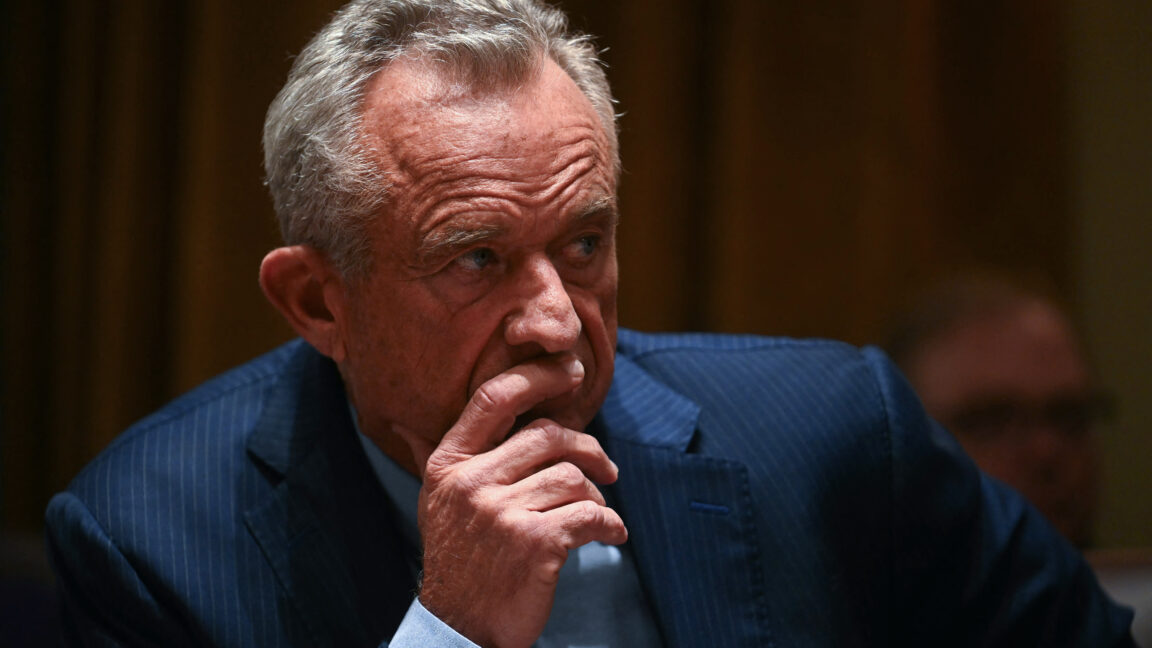
ARSTECHNICA.COM
Revolt brews against RFK Jr. as experts pen rally cries in top medical journal
Rally
Revolt brews against RFK Jr. as experts pen rally cries in top medical journal
"If our usual approaches are not effective, other strategies must be used."
Beth Mole
–
Apr 9, 2025 5:10 pm
|
69
US Secretary of Health and Human Services nominee Robert F. Kennedy Jr. listens as President Donald Trump holds a cabinet meeting at the White House in Washington, DC, on February 26, 2025.
Credit:
Getty | Jim Watson
US Secretary of Health and Human Services nominee Robert F. Kennedy Jr. listens as President Donald Trump holds a cabinet meeting at the White House in Washington, DC, on February 26, 2025.
Credit:
Getty | Jim Watson
Story text
Size
Small
Standard
Large
Width
*
Standard
Wide
Links
Standard
Orange
* Subscribers only
Learn more
Health experts took to one of the country's leading medical journals to pen searing rebukes of Robert F. Kennedy Jr.'s first weeks as the country's top health official—and they called upon their colleagues to rise up to fight the misinformation and distrust they allege Kennedy, a long-time anti-vaccine advocate, is fomenting.
From gutting federal health agencies and knee-capping critical local public health programs, to delaying a significant vaccine advisory meeting, hiring a discredited anti-vaccine advocate to conduct a vaccine study, ousting the country's top vaccine regulator, and undermining the response to the mushrooming measles outbreak in Texas that stands to threaten the country's measles elimination status—the researchers had no shortage of complaints.
In one article, pediatric infectious disease expert Kathryn Edwards of Vanderbilt University recounted the timeline of the measles outbreak, noting the missteps, missed opportunities, and controversial comments Kennedy made along the way. The rundown included his trivialization of the outbreak, failure to strongly advocate for vaccination, promotion of unproven treatments, like cod liver oil, and delayed responses from the Centers for Disease Control and Prevention, which Kennedy controls.
The debacle indicates that researchers and health officials may no longer be able to rely on the CDC for timely guidance and evidence-based recommendations, she wrote. And if so, the medical and science communities need to step up and fill the void.
"The measles outbreak must be approached with scientifically based recommendations for immunization and infection control," Edwards concluded. "If the usual government sources of information cannot be relied on, medical journals and specialty societies must fill that gap. If our usual approaches are not effective, other strategies must be used."
“Courage and clarity”
In a more acerbic article, Vanderbilt researchers Jeremy Jacobs and Garrett Booth blasted Kennedy's appointment of infamous anti-vaccine advocate David Geier to lead a federal study on immunizations and neurodevelopmental outcomes. Geier and his father, Mark Geier, were named in 2010 by Nature magazine to be among the top science deniers. The duo is known for endlessly promoting the exhaustively debunked false claim that vaccines cause autism, which Kennedy also promotes. Mark Geier was stripped of his medical license over accusations he mistreated children with autism, and David Geier, who has no medical background, was fined for practicing medicine without a license.
Jacobs and Booth argued that hiring David Geier compromises the integrity of the scientific process, erodes public trust, and provides a platform for unreliable information. It's a "dangerous concession to pseudoscience," they wrote.
"Elevating figures known for spreading unreliable information threatens not only the integrity of individual research efforts but also the broader public confidence in science," they wrote. "It sends a message that fringe views deserve equal standing with evidence-based consensus."
The moves from Kennedy highlight escalating threats to science and medicine, the researchers wrote. Like Edwards, they called for researchers and health experts to stand up to defend evidence-based medicine.
"At this critical juncture, public institutions and academic leaders must demonstrate courage and clarity," they wrote. "If science is to remain a trusted foundation for public health, its stewards must be selected not for their ability to generate controversy, but for their commitment to truth. That requires rejecting the normalization of unreliable information and reaffirming our collective responsibility to safeguard the integrity of public health."
Beth Mole
Senior Health Reporter
Beth Mole
Senior Health Reporter
Beth is Ars Technica’s Senior Health Reporter. Beth has a Ph.D. in microbiology from the University of North Carolina at Chapel Hill and attended the Science Communication program at the University of California, Santa Cruz. She specializes in covering infectious diseases, public health, and microbes.
69 Comments
0 Kommentare
0 Anteile
98 Ansichten


